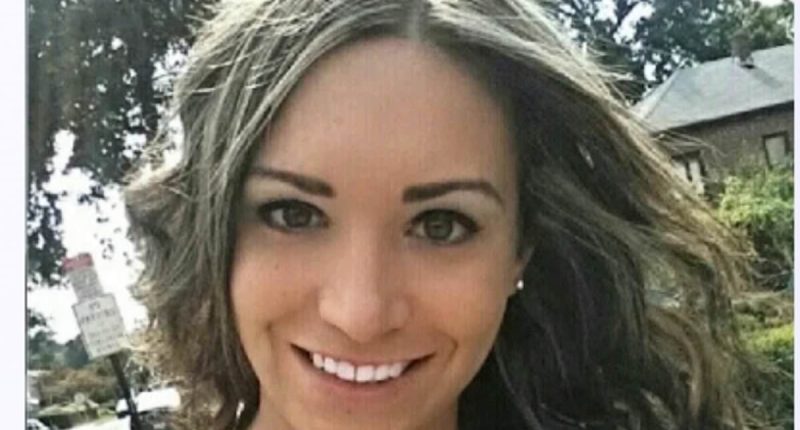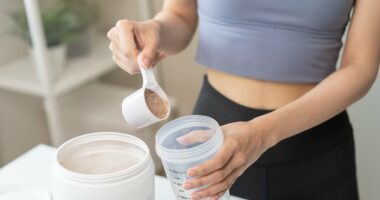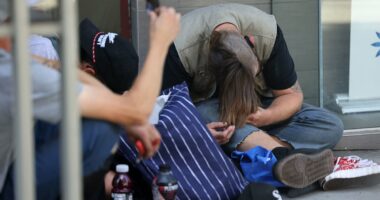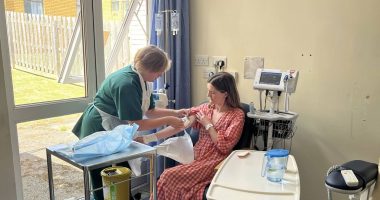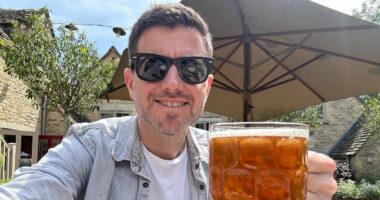Share this @internewscast.com
Debbie Howland believed she was saving her daughter, Ava, when she sent the artistic, champion cheerleader to a rehab program in Florida.
Ava was about 22 when she first went to a rehab in 2015 for an addiction to painkillers and heroin that she had been battling for about a year. She was doing well, but the facility in Florida was too expensive for her to stay.
She went back to her home state of Pennsylvania, but struggled to find a doctor to prescribe Suboxone, a life-changing treatment for opioid withdrawals and cravings. And Ava was struggling to stay sober with outpatient therapy alone.
‘As her mother, I could see she was deteriorating. And so I told her, you have to go somewhere,’ Howland told the Daily Mail.
Then one day in outpatient treatment, Ava was introduced to a person who would launch her into a ruthless cycle of fake treatments, kickbacks, and forced relapses that would eventually claim her life.
Ava had been introduced to a middleman known as a patient broker who profits by delivering insured addicts to detox centers, earning $500 to $5,000 per person, sometimes without the patient receiving meaningful addiction care.
Ava flew to Ft Lauderdale in October 2016 to a detox center where she was thrust into the ‘Florida Shuffle,’ a web of illegal patient brokering and insurance fraud that has claimed countless lives.
Ava eventually overdosed on fake pills that Howland believes were cut with fentanyl in a Florida sober home, placed there without the resources or treatment she needed to survive.
![Debbie Howland said her daughter Ava [pictured], who was addicted to heroin, ¿got wrapped up with people that were basically buying and selling her for her insurance card,¿ adding, 'she never got well'](https://i.dailymail.co.uk/1s/2025/06/27/21/99802979-14855231-image-a-13_1751055769298.jpg)
Debbie Howland said her daughter Ava [pictured], who was addicted to heroin, ‘got wrapped up with people that were basically buying and selling her for her insurance card,’ adding, ‘she never got well’
Patient brokers, sometimes called body brokers, troll Alcoholics Anonymous (AA) and Narcotics Anonymous (NA) meetings or loiter near drug hotspots, others lurk in addiction Facebook groups, bribe hospital staff, and hang around psych wards, bus stations, and drug dens.
According to parents of addicts, brokers lure people in with free flights, detox, housing — even offering drugs for ‘one last fix’ before rehab.
From there, they’re funneled into sober homes, some where staff ignore relapses, use drugs themselves, and keep patients trapped in a deadly, cash-for-bodies cycle.
Howland said that Ava ‘got wrapped up with people that were basically buying and selling her for her insurance card.’
‘I personally use the word human trafficking,’ Howland told the Daily Mail. ‘These brokers, or whatever you want to call them, were getting paid to grab up people to keep the detoxes and sober homes filled.
‘It’s not just about the insurance money, it’s about people dying. The people who were caught in this never got the care that they deserved.’
Breezy Delray Beach, tropical Ft Lauderdale, gilded West Palm Beach. All of them sound like dream settings for sobriety and revitalization.
Dubbed ‘Rehab Riviera,’ Florida runs the nation’s second-largest rehab industry after California, with hundreds of outpatient, inpatient, and detox programs feeding the system.

Ava went to Ft Lauderdale at 20 to quit heroin—unaware she’d be trapped in a cycle of detox and relapse
But behind its swaying palms and beachfront mansions, there is a ruthless world where some addicts are traded like poker chips in an insurance fraud racket.
Howland told the Daily Mail that Ava fought to get sober, but every time she neared a state of stability, a new obstacle would appear.
‘I used to drive her to the AA and the NA meetings,’ Howland said. ‘Unfortunately, basically, every time she went to an AA or any meeting, another person who dealt drugs came in, and that was the end of that.
Once in Florida, Ava would cycle through detox, a sober home, relapse, get kicked out without her meds, then be picked up by a broker in a free Uber and sent to the next detox center.
The patient broker is just one cog in a sprawling addiction-for-profit machine. It’s a web of insurers, labs, and rehab owners who all profit from relapse.
Most rehabs offer 30- or 60-day stays, not because it works, but because that’s what insurers typically cover. Detox stays are only about two weeks.
Brokers are paid to bring addicts like Ava to detox centers where they can dry out, often enduring agonizing withdrawal without receiving any valuable treatment for their addiction.
The detox facility then bills the new patient’s insurance for many services – medical exams, psychiatric consults, and medication – though many addicts have said they receive none of these services.
Detox centers can also rake in up to $20,000 weekly in reimbursement from patients’ insurance companies for administering drug urine tests.
The multi-billion-dollar industry is largely funded by pee in cups, which staff have come to call ‘liquid gold.’
After detox, addicts are sent to sober homes, some of which withhold life-saving medication like Suboxone to trigger painful withdrawal, all while dealers operate nearby.
House managers in sober homes where Ava stayed would let people drink, do drugs, ‘or disappear and die,’ Howland said.
When the patient leaves and/or relapses, the broker gets a kickback for sending them back to the detox center for another lucrative stay.
The more relapses, the higher the payout: a single patient with decent coverage can be milked for over $1 million in fraudulent urine tests and phantom therapy sessions before being dumped back onto the streets.

Howland testified in a federal DOJ case exposing a Florida detox network that drugged patients with sedative-laced ‘comfort drinks’ to keep them compliant. She continues to be a staunch advocate for people suffering from addiction and their parents
Every time Ava was kicked out of a sober home, her mother would get a call in the middle of the night.
She said: ‘I kept saying to her it’s got to be you. You can’t be getting thrown out of a place every two weeks. And she kept saying, no, mom, you don’t understand. And I didn’t, but I do now.’
Ava died at 24 on May 11, 2018. Several people she knew well followed, like a domino effect, Howland said.
‘Of the eight people that I met that day [that Ava died], five are dead now.’
After Ava died, Howland’s world crumbled.
‘I couldn’t get through the day without losing my breath,’ Howland said. ‘You get on your hands and knees, you pound the floor, you pray to God, why my kid?
‘I had to face the fact that my daughter was telling me the truth and that it was me that called her a liar,’ she added. ‘But it wasn’t her. Because nothing she was going to do was going to stop what was happening to her.’
In her experience as a parent and advocate, Howland testified in a federal DOJ case exposing a Florida detox network, though Ava was not a patient, for drugging its patients with sedative-laced ‘comfort drinks’ to keep them compliant.
After a seven-week trial, a federal jury in Southern Florida convicted Jonathan and Daniel Markovich for a $112 million fraud scheme at their addiction centers, Compass Detox and WAR Network.
They billed insurers for unnecessary treatments, cycled patients through costly detox programs, and paid illegal kickbacks, while sedating patients.
Jonathan Markovich, 37, was sentenced to about 15 and a half years in prison, while his brother Daniel, 33, received a sentence of just over 8 years.
But Howland’s grief will never truly end.
‘Your tears never stop. You never stop getting choked up when you talk about your child,’ she said.
‘You walk into a grocery store and damn, you see a box of chocolate covered cherries, and that’s it. You’ve got to leave your cart and go, because you’re just going to break down.’
